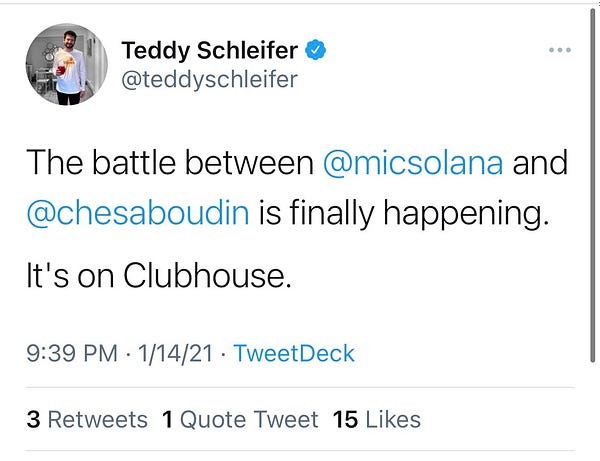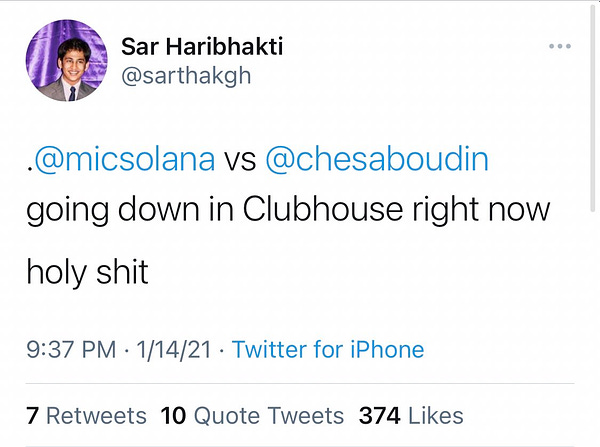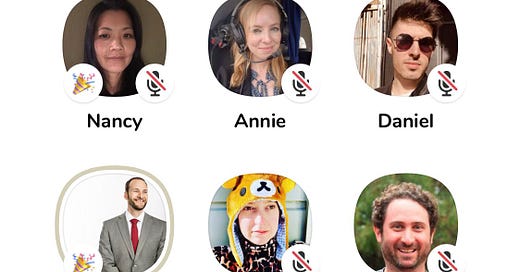Founders Fund Duo Outmatched by SF District Attorney on Clubhouse
San Francisco District Attorney Chesa Boudin joined the chat.
The guy they were trashing suddenly joined the room and schooled them.
There are few greater joys to be found on the internet.
Mike Solana and Delian Asparouhov, a vice president and a principal respectively at Founders Fund, were chatting animatedly with startup founder Michelle Tandler on the audio app Clubhouse. They were attacking Silicon Valley’s latest villain — a man who has unified normie tech Democrats with its trolling-libertarian-rightwing-authoritarian faction. That man is Chesa Boudin, the San Francisco District Attorney whose parents were members of the militant leftist group the Weather Underground. Boudin, a former public defender, has navigated his first year in office in a pandemic.
San Francisco’s tech elite is increasingly up in arms about rampant crime and homelessness. Some people in the tech industry have been pushing to recall Boudin. There’s a fundraising campaign to hire a reporter to investigate him.
For a few minutes, the chat contented itself with criticizing Boudin for his sympathies to Hugo Chavez and for what they saw as exploding crime in San Francisco.
Suddenly, one of the members of the chat noted that Boudin had joined the room and Boudin was quickly invited to the stage. So there he was, the District Attorney of San Francisco, facing up against some venture capitalist Twitter trolls.
Boudin said that a friend had texted him about the chat. “The whole framework for these conversations is based on lies,” he said, accusing the hosts of spreading “misinformation.”
The conversation was most heated at the outset. The hosts defiantly pointed to Boudin’s own Wikipedia page to show that he had worked for the socialist Venezuelan leader. Boudin criticized them for getting their facts from Wikipedia. Boudin made several assertions: that he’d never met Chavez, that he had never been paid by the Venezuelan government, and that he’d written a book of translations paid for by an American publisher. To my ear, it didn’t feel like Boudin was really trying to be fully open and honest about the extent of his Chavez sympathies or how close he got to the government. Solana and crew didn’t seem to know how to pursue the line of questioning with an uncooperative witness who is far more familiar with his own life story than they are. The hosts’ continued reliance on Wikipedia as their main source of evidence made them look feeble. Ultimately, the group seemed to accept Boudin’s deflections. This morning someone made a subtle alteration to a line in Boudin’s Wikipedia page.
I’ll leave it to San Francisco local reporters more steeped in Boudin’s history to fact-check this one. I thought the whole line of questioning was silly. The man is the District Attorney already. His policies and actions matter far more than his youthful escapades.

Then the conversation shifted to crime in the city. Boudin said that crime was down, though he also acknowledged that house break-ins are up substantially. Boudin rattled off data that the hosts seemed unprepared to rebut.

Bowed by his numeracy and insider knowledge of how the San Francisco legal system actually works, the moderators essentially handed Boudin a friendly platform on which to explain his point of view. Boudin opined on the systematic failings of San Francisco’s legal system and its bureaucratic red tape. He argued that it is particularly hard to prosecute people while we are in the pandemic and attributed some of the city’s problems to a lack of jury trials in the pandemic. It was a nice moment of comity, if not the one the hosts seemed like they were setting out to create.

Eventually the conversation turned to the tragic New Years Eve deaths of two women in a hit-and-run. The suspect had been on parole and then wasn’t arrested for a possible car theft days before the women’s deaths. Boudin took some blame for what happened but made sure to outline all the other government entities that also could have taken actions that might have avoided the tragic chain of events.
I appreciated that Solana and crew gave Boudin time to speak, but I think if they want to attack him on Twitter, it would have been better to make their best case against him live, so he had an opportunity to respond to it.
For what it’s worth, burglary, arson, and homicides were all up significantly in November 2020 compared with the previous year, according to local reporting. Other crimes like rape, robbery, and assault were down.
At some point Balaji Srinivasan joined the chat. Srinivasan started to tee up a question for Boudin’s old political foe Nancy Tung, who was also in the Clubhouse room. Srinivasan seemed to want Tung to play expert witness — which Boudin clearly saw as a political loser for him. Boudin said that he thought the question was “speculative” and took the opportunity to leave the chat having bested his political antagonists.



Jason Calacanis later told the Clubhouse that Boudin had been “snowing everybody in this room.”
Founders Fund’s Brian Singerman spoke up after Boudin left. He offered a more magnanimous take. “Chesa is extremely smart and he is extremely savvy and it is definitely not all his fault but a lot of it is,” Singerman said. “I don't know how to fix it. I don't know how to fix it holistically.”
Singerman seemed to signal on Clubhouse that he’d prodded Boudin to join the conversation. I texted Singerman this morning. He replied that he’d encouraged Boudin “to come so people could hear directly from him.”
As the conversation on Clubhouse wrapped up, Marc Andreessen made an appearance articulating what seems to be a more nihilistic turn. “Doesn't the buck stop with the voters,” he asked. “Isn't this what the voters want?”
“They've elected like an entire government with extreme views,” Andreessen said. “The voters seem happy with it.”
A couple quick takes: one, it’s a simple story of hubris. Solana and Asparouhov are so cocky on Twitter and tech generally has such a condescending view of politicians, to see them humbled a little bit was gratifying. I respect that neither had time to prepare for this epic moment. But if they’re so solidly against him, I would have hoped they could have articulated a better case. Two, it’s interesting to see all the self-interested thinking on Twitter reacting to the conversation. I have no idea whether Boudin is the best person for the DA job. It’s a case where I truly don’t have a political point of view. But to watch people reinterpret Boudin’s performance as a failure seemed to demonstrate how much we view political discussions based on which side we’re rooting for. Three, the whole incident made me excited about audio! On Twitter, antagonists don’t have to listen to their critics. Their failure to respond to critics shows their high status, not their inability to defend their positions. On Clubhouse, where the line goes silent if you don’t reply, you’re forced to actually have a thoughtful response or reveal that you don’t have one. Still, Twitter played a big role in distributing the Clubhouse conversation. Many people seemed to consume it through tweets.
Now Solana seems to be trying to retcon what happened.



The moderators sounded much more dejected last night, saying that they would have liked to prepare more and that Boudin is “a great politician, honestly.” One of them, I think it was Solana, even paid tribute to journalists. I took that as a nod to the moderators’ failures to keep up with a talented politician.
As the evening unfolded, a second Clubhouse room emerged titled “`Future of SF’ really means `Make SF more white.’”

If Clubhouse becomes a bigger political platform, moderators will have a lot of sway. Yes, people face more pressure to respond to their critics than on Twitter — but only if they give critical voices an opportunity to speak in the first place. Whoever starts the conversation has immense power to shape the debate and control who can participate in it.

Thankfully, this time Boudin got the chance to face his critics. Will they give him the same opportunity next time?






